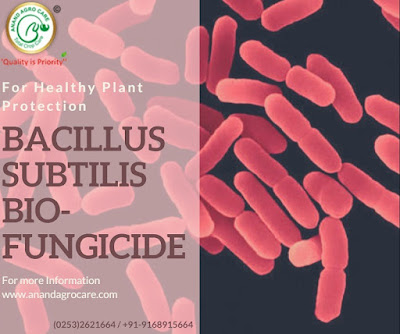Bio fungicide contains a microorganism as the active
ingredient. Bacillus
subtilis is an aerobic bacterium. It is a rod-shaped and catalase-positive.
Bacillus subtilis is found in soil and the gastrointestinal
tract of ruminants and humans. It is a spore-forming bacterium that colonizes
the plants ' root system as it is applied to seeds.
Bacillus subtilis is not harmful to non-target organisms or to
the environment. Because of the natural occurrence of the bacterium on roots
and the lack of aquatic exposure from seed treatment use, no harm is foreseen
to beneficial insects or to aquatic species. Because birds may eat seeds
treated with this bacterium, its effect on terrestrial birds was tested and no
toxic effects were seen. Tests show also that this bacterium does not harm
seeds or cause them to decay.
Many types of bacteria die out when the soil dries up and
becomes unfavourable for their growth. Bacillus species, on the other hand,
develop spores which can survive for a long time and withstand stressful
conditions. As soon as conditions improve, the spores germinate because of
various environmental signals. The ability of the bacteria to survive as spores
makes it easier to produce formulations to use to treat plants. Bacillus
subtilis biofungicide competes
with other microorganisms through the development of antibiotics that either kill
competition or reduce their growth rate.
Benefits of Bacillus subtilis bio-fungicide for growth of plants
- Safe for the environment and farmers
- Preventively limits growth and development of diseases in crops
- Activates plant’s own defense system
- Effective even in hard weather conditions
- Helps to fight against various plant pathogens
- Beneficial for agricultural crops
- Active even under harsh weather.
Anand Agro Care is
leading in bacillus
subtilis biofungicide manufacturer and supplier in Nashik, India. Our product
Dr. Bacto’s Bactus a bacillus subtilis biofungicide manufactured
to protect against the effects of soil and foliar bacterial and fungal
diseases. Applied at planting or through chemigation, it quickly builds a
disease-protection zone around the seed or transplant. It preventively limits
growth and developments of disease in crops & activates plant's own defence
system.


No comments:
Post a Comment